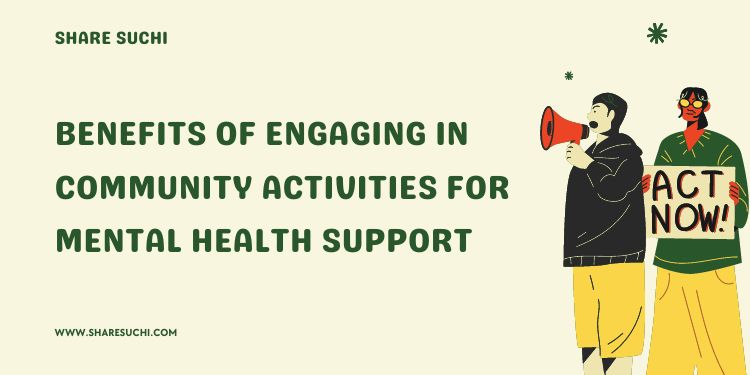Do you know there are benefits of engaging in community activities for mental health support?
In today’s fast-paced world, where digital interactions often replace face-to-face connections, the importance of engaging in community activities has never been more evident.
Participating in community-based events and groups not only fosters a sense of belonging but also offers significant benefits for mental health. Here’s how community activities can be a crucial support system for mental well-being.
Table of Contents
Here are the Benefits of Engaging in Community Activities for Mental Health Support
Building Social Connections
One of the most immediate benefits of engaging in community activities is the opportunity to build social connections. Whether it’s a local book club, a sports team, or a neighborhood cleanup, these activities bring people together, helping to forge relationships that might otherwise remain untapped.
For individuals struggling with loneliness or social isolation, these connections can be lifesaving. Studies show that having strong social networks can reduce the risk of depression, anxiety, and even cognitive decline.
Sense of Belonging
Participating in community activities can also foster a profound sense of belonging. When individuals come together for a common cause, they develop a shared identity and purpose. This feeling of belonging is vital for mental health, as it provides a support network during challenging times.
Whether you’re facing personal struggles or broader life challenges, knowing that you belong to a group that cares about you can significantly alleviate stress and anxiety.
Boosting Self-Esteem
Engaging in community activities can also boost self-esteem. Contributing to a cause, achieving goals, and receiving positive feedback from others can increase self-worth.
For people who may be struggling with low self-esteem or feelings of inadequacy, community involvement offers a platform to develop new skills, showcase talents, and receive recognition, all of which are essential for mental well-being.
Reducing Stress
Life pressures can build up, leading to chronic stress, which negatively impacts mental and physical health. Community activities offer a healthy outlet for stress relief.
Whether it’s through physical activities like group exercise or more relaxed engagements like art classes, being part of a community can help reduce stress levels. Additionally, being around others who are also managing similar stressors can provide mutual support and coping strategies.
Enhancing Emotional Resilience
Emotional resilience—the ability to bounce back from life’s challenges—is critical for maintaining good mental health. Community activities can enhance this resilience by providing a supportive environment where individuals can share experiences, learn from each other, and develop coping mechanisms.
In times of crisis, the emotional support from community members can make a significant difference in how one navigates difficult periods.
Encouraging Positive Behavior
When individuals engage in community activities, they are often surrounded by positive influences and role models. This environment encourages healthy behaviors and lifestyles, which can have a direct impact on mental health.
Whether it’s adopting a healthier diet, getting regular exercise, or practicing mindfulness, the collective encouragement from a community can motivate individuals to make positive changes.
Providing a Sense of Purpose
Many people struggle with finding meaning and purpose in their lives, which can lead to feelings of emptiness and depression. Community activities often revolve around a cause or goal, giving participants a sense of purpose.
Whether it’s volunteering, mentoring, or participating in local governance, these activities provide a way for individuals to contribute to something larger than themselves, which is a key component of mental well-being.
Conclusion
Engaging in community activities is more than just a pastime; it’s a powerful tool for enhancing mental health. By building social connections, fostering a sense of belonging, boosting self-esteem, reducing stress, enhancing emotional resilience, encouraging positive behavior, and providing a sense of purpose, community activities offer a comprehensive support system for mental well-being.
In a world where mental health challenges are increasingly common, finding strength and support within our communities is invaluable.
FAQs
How can participating in community activities improve my mental health?
Participating in community activities can significantly improve mental health by providing social connections, reducing feelings of isolation, and enhancing self-esteem. Engaging with others in a shared activity can help alleviate stress, foster a sense of belonging, and increase emotional resilience. These positive interactions and experiences contribute to overall well-being and can help combat issues like anxiety and depression.
What types of community activities are best for mental health support?
Activities that promote interaction and engagement are particularly beneficial for mental health. These can include group sports, volunteering opportunities, book clubs, art classes, or local support groups. The key is to choose activities that align with your interests and allow for meaningful connections with others, fostering a supportive and positive environment.
How can I find community activities in my area?
To find community activities near you, start by checking local community centers, libraries, and bulletin boards. Online platforms like Meetup, Facebook Events, and local event directories can also be great resources. Additionally, reaching out to local non-profits, churches, or social service agencies can provide information on various activities and volunteer opportunities.
Can community activities help with specific mental health conditions like depression or anxiety?
Yes, community activities can be particularly helpful for individuals with mental health conditions such as depression or anxiety. Engaging in social interactions, physical activities, and purpose-driven tasks can provide emotional support, reduce symptoms, and improve overall mental well-being. However, it’s important to complement these activities with professional mental health treatment if needed.
What if I’m shy or introverted—how can I still benefit from community activities?
If you’re shy or introverted, start by choosing smaller, less intimidating community activities where you can gradually build comfort and confidence. Volunteering for behind-the-scenes roles or joining online groups with similar interests can also be a good start. Over time, as you become more familiar with the environment and participants, you may find it easier to engage and benefit from the supportive community.

